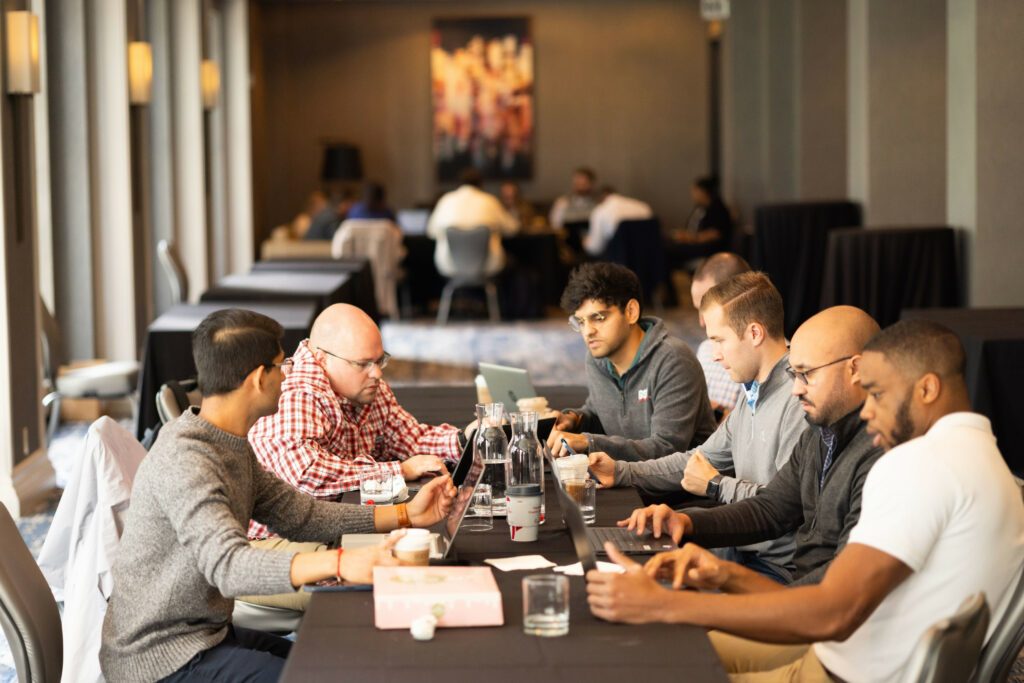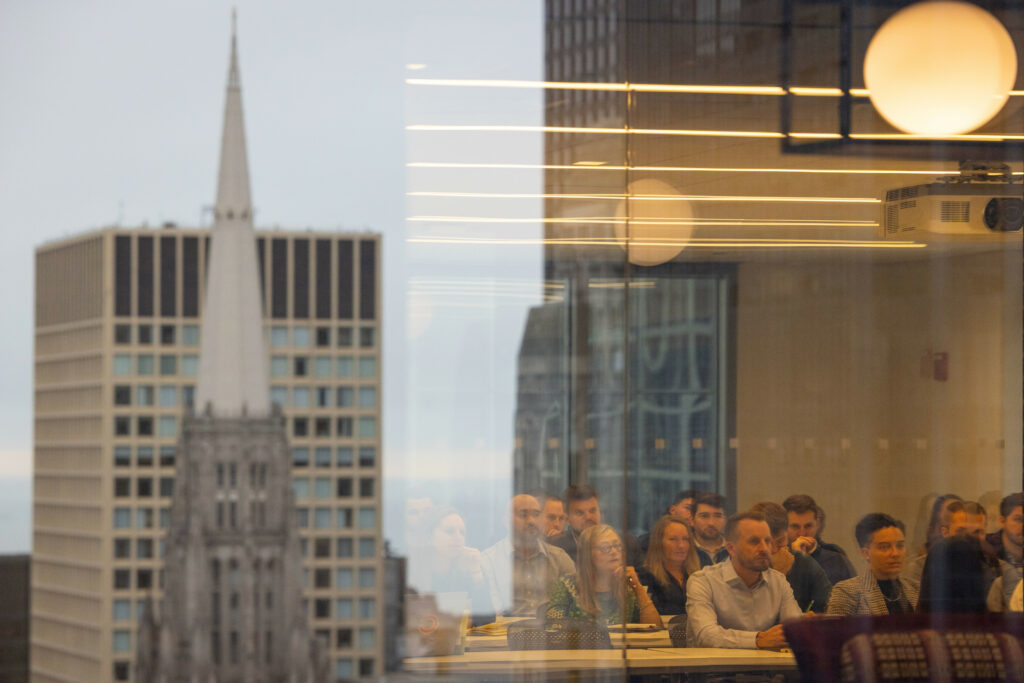Home to the Wrigley Company and Sears, Roebuck and Co., Chicago has provided the backdrop to some of the biggest business stories of the 20th century.
This fall, University of Georgia Professional MBA students traveled to the Windy City to write their own 21st-century business success stories.
“Being in Chicago and stepping outside the ecosystem that I know was really eye-opening,” said Darrell Powers, an Air Force veteran, Atlanta Hawks cheerleader and Terry PMBA student who traveled to Chicago for the domestic residency this fall.
“Seeing how businesses operate in different cities and on an international stage put a lot of things into perspective for me,” he added.
The trip — part of an annual domestic residency offered by the UGA Terry College of Business PMBA program — allowed students to meet with executives at Chicago-based companies such as the Chicago Bears and Mondelez International. However, PMBA administrators built the residency around a business consulting challenge for global healthcare and agriculture firm Bayer.
It was only a four-day trip, but in those four days, students bonded with their project groups, tackled new challenges, networked with Chicago business leaders and delivered an executive-level presentation to a multinational company.
The Terry College PMBA program offers working professionals the chance to earn a UGA MBA in 17, 20 or 23 months through a mix of in-person, evening, or Saturday classes and distance learning. Students in the PMBA program have several years of work experience, so the residency offers a chance to see how companies outside their industry and Georgia operate.
“I think it’s added a bit of diversity to my business knowledge,” said Gustavo Brandao, a PMBA student working as an operations manager for Promontory-IBM Consulting. “I don’t have a lot of insight into sports or pharmaceuticals or food; I focus on the financial services sector. So, this trip opened my eyes to the ways other industries do things. This is a good opportunity for me to leverage some of the lessons I learned from their operations when I go back to the financial services side.”
Students started on their Bayer consulting challenges a few weeks before the residency. Each team was charged with creating a go-to-market strategy for a new medical technology that Bayer — in this scenario — planned to introduce in Latin America.
Thanos Karras, head of digital solutions for Bayer in the Americas, told them about the platform and the company’s health technology background but urged them to research everything else they would need to inform their go-to-market strategy.
In addition to delving into a new industry, students faced the challenge of working with a team of classmates they hadn’t worked with before.

“We grew somewhat accustomed to our groups from our classes and were comfortable with them,” said Tyler Reeves, a senior investment analyst at Weyerhaeuser who holds a PhD in forestry. “Working with other individuals and learning how they operate in a condensed timeframe was a challenge but rewarding in the long term.”
By the end of the trip, the newly-minted consulting groups were up to speed on the shape of healthcare in Chile, Columbia, Brazil, and Mexico and the role Bayer’s new product could play.
“The business consultancy challenge forces the students to think about something they know very little about, approach it from a problem-solving mindset, do their research, and then come back with a solution,” said Susan Brown, director of Terry College Professional, Executive and Online MBA programs. “They may not all go out and be consultants after they graduate, but everybody has to solve problems. Everyone has to think like a consultant at times, and that’s what we try to teach them with this exercise.”
The students used their time between tours of Chicago’s architectural heritage and business visits to polish their reports before presenting them to Karras on the final day.
“You all did an amazing job,” Karras told them before rating the presentations as part of an informal competition. “I’m going to be judging on data validation — did what you say fit with what I already know? Two, did I learn something, and was there an ‘aha’ moment? And three, the general presentation.”
In the end, Team Columbia provided that “aha” moment.
Whether they were on the winning team or not, the consulting project helped students put what they learned during the PMBA program into perspective.
“Because I come from a clinical background, and I’m new to the business world, it has sometimes been a struggle to apply concepts,” said Kathryn Yaple, a student and manager of clinical information technology at Wellstar Health System and a member of the Columbia consulting team. “This project helped me gain a more holistic view of the business world. When I was listening to the other teams’ presentations, I was, ‘OK, we’ve covered that concept.’ It validated what I’ve learned and helped me to assimilate those lessons into the real world.”
A big part of the PMBA experience is broadening student perspectives and helping them incorporate what they learn with their existing skill sets. That’s what domestic residencies — like the trip to Chicago — do so well, Brown said.
“You don’t see things the same way after you travel,” Brown said. “You don’t understand some of the concepts you learn in class until you start that business strategy challenge. The residency program helps students put together pieces of their MBA coursework in a meaningful way … It allows them to broaden their network and broaden their understanding and experience.”
“When I come back from traveling, I’m much more creative and innovative because I see things through a different lens,” she added. “Travel broadens your world. That’s why we travel with our students.”

